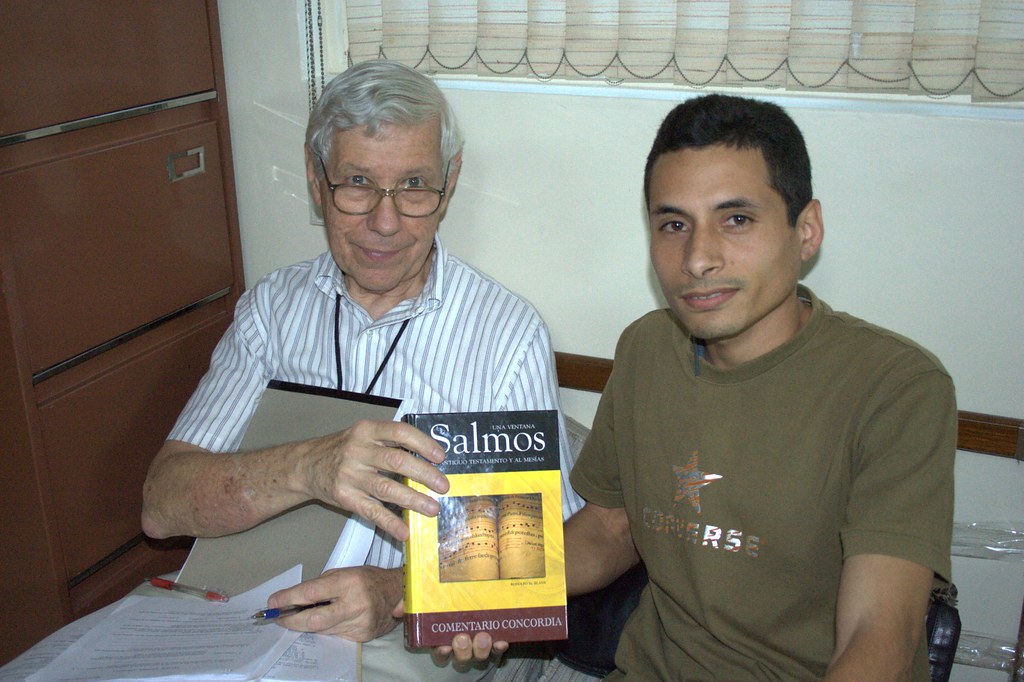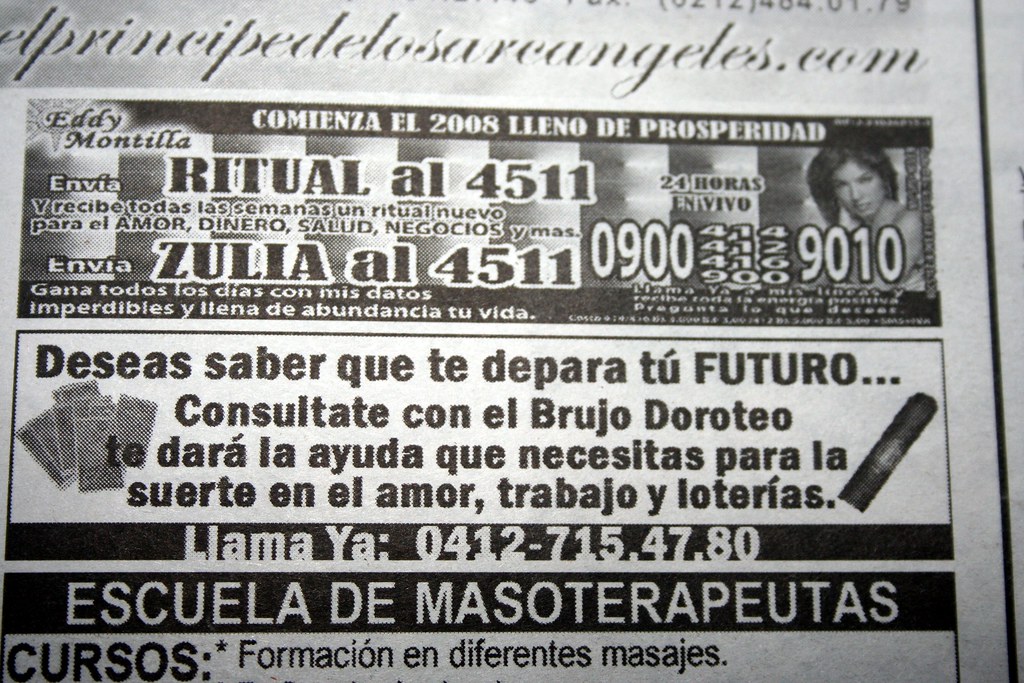We lost one of the little girls in our preschool. She had lived in La Caramuca with her mother as the only parent in the household, but then the mother's mind became unbalanced as a result of her involvement with "espiritismo", or attempts to communicate with the spirit world. Because of some experience she had while engaged in this occult activity, the woman was found running through the streets of La Caramuca stark naked and stark raving mad. So the little girl and her mother have been taken in by relatives in Barinas and no longer live here. We will continue to pray for them.
This kind of thing is not at all uncommon in Venezuela, where much mental illness is associated with the witchcraft that pervades the culture here. The practice of magic is not confined to the poor and uneducated, but is found among the highest levels of society as well. Astrologers and mediums take out advertisements in the newspapers, television and radio, boasting of their supposed accuracy in predicting the future. especially in regard to the lottery, horse races and other forms of gambling that are so prevalent here. It is often said that when Venezuelans get sick, it is typical for them to consult a bruja (witch) or espiritista (medium) before going to a medical doctor. Of course, many people seek magical aid in gaining either love or revenge, too.
We discussed much of this in the seminar on the Psalms that Eduardo and I attended in Caracas during the last week of May. Our professor was Dr. Rudy Blank, who currently is a member of the faculty of the Center for Hispanic Studies at Concordia Seminary, St. Louis, Mo.

Dr. Blank was born the son of German immigrants in Chicago. He graduated with a master's degree in divinity from Concordia Seminary in 1959, after serving a year of vicarage in Venezuela from 1957 to 1958 (the year of my birth). From 1959 to 1962 he served as pastor of Resurrection Lutheran Church in Cambridge, England. In 1963 he returned to Venezuela to serve as a missionary until 2003. During this period, he was also able to complete additional postgraduate studies at Fuller Theological Seminary, Pasadena, Calif., and Concordia Seminary, St. Louis. For 19 years he was based in Ciudad Guayana, Venezuela, where Luz María lived at roughly the same time. She received much of her theological instruction from "Pastor Rodolfo."
 Concordia Publishing House has published several books by Dr. Blank. One of them, "Salmos: Una Ventana Al Antiguo Testamento Y Al Mesías" served as a our textbook for the seminar in Caracas.
Concordia Publishing House has published several books by Dr. Blank. One of them, "Salmos: Una Ventana Al Antiguo Testamento Y Al Mesías" served as a our textbook for the seminar in Caracas.
There was a lot of material to cover. Perhaps most enjoyable was learning how the Psalms have inspired many hymns in many languages. For example, Psalm 46 provided the basis for Martin Luther's hymn, "A Mighty Fortress" ("Castillo Fuerte" in Spanish) and "Dios es nuestro amparo", which is a favorite at Corpus Christi Lutheran Church in Barinas:
"Dios es nuestro amparo, nuestra fortaleza,
Nuestro pronto auxilio en la tribulación.
Aunque se traspasen los montes a la mar,
Y aunque la tierra tiemble, tenemos que cantar.
Aunque la tierra tiemble, tenemos que cantar.
"Cielo y tierra pasarán, más Tu Palabra no pasará
Cielo y tierra pasarán, más Tu Palabra no pasará.
No, no, no pasará. No, no, no pasará."
Likewise, Psalm 92 is the basis of another Spanish hymn, "Bueno es alabarte, Jehová," which Pastor Francisco Cabarcas, chaplain of Cristo Rey Lutheran School in Maturin, recalled singing in the small village in Colombia where he was born and raised:
"Bueno es alabarte, Jehová, cantar salmos a Tu nombre.
Bueno es alabarte, Jehová, cantar salmos a Tu nombre.
Anunciar por la mañana Tu misericordia
Y Tu fidelidad de noche.
Anunciar por la mañana Tu misericordia
Y Tu fidelidad de noche."
Just as enlightening, but more sobering, were the parallels between the culture in which the psalms were written and that of Venezuela today, especially the psalms which declare the sovereignty of God over all other powers, whether those of human government, the forces of nature or spiritual entities.
"Ba'al" was a Canaanite word that meant, in its broadest definition, "lord". It was used in reference to human kings and heroes as well as many local deities. The great Ba'al spoken of in the Old Testament, the chief god of the Canaanites, was believed to have the power to send rain for annual crops and fertility for crops, livestock and humans. The priests of Ba'al were believed to have the power to foretell the future and cast spells. Worship of Ba'al included animal and human sacrifice, self-mutilation, and acts of ritualized sex, both hetero- and homosexual, all aimed at placating the god and gaining his favor.
Perhaps even more terrifying than Ba'al was his consort, the goddess Anat, who, it was said, liked to bathe in the blood of her enemies. Worse than either Ba'al or Anat was Mot, the god of death and chaos, who was Ba'al's chief adversary. Nevertheless, Mot had his worshipers, too.
There were many other cruel and capricious deities worshipped by the nations surrounding Israel, such as Moloch, the Phoenician god who specifically demanded child sacrifice.
Many of the ancient Israelites believed that the supplication of these dark deities could be harmonized with the worship of Yahweh, the God of Abraham, Isaac and Jacob, who revealed Himself to Moses on Mount Sinai. In an age of tribal gods, they thought perhaps the power and authority of Yahweh had geographical limits. Or, if Yahweh seemed distant and unwilling to answer their prayers, other deities could be called on to lend their aid.
Attitudes in Venezuela today are not very different. The Triune God is only one among a number of spirit-beings to whom one may appeal. These may include the Virgin Mary and the saints, pagan deities peculiar to Venezuela, and "imported" cults such as Santeria (a Caribbean-based cult derived from ancient African beliefs) and the cult of Santa Muerte (Holy Death).
The cult of Santa Muerte is similar to ancient Canaanite worship of Mot, the god of death and chaos. As a modern cult it originated in Hidalgo, Mexico, in 1965. Now with millions of adherents in Mexico, the United States and Central America, the cult has made some inroads into Venezuela. It is a revival of the worship of the Aztec goddess of death, who in ancient times was offered animal and human sacrifices. The cult is especially popular among drug traffickers, other smugglers, gangsters, prostitutes and homosexuals, but also claims followers among the higher classes. The basic idea is that by making a pact with Santa Muerte, one can gain invulnerability to death, the power to inflict death upon one's enemies, or other benefits in this life.
Thank God the Psalms affirm now, as they did in ancient Palestine, that the practitioners of witchcraft and idolatry, whether they are simple con artists or actually in communion with demons, have no real power. As Psalm 96 says:
"For the Lord is great, and greatly to be praised,
He is to be feared above all gods.
For all the gods of the peoples are idols,
But the Lord made the heavens."
It is the Triune God who is truly Lord of creation and in Whom we can trust for whatever we need. We also have the messianic promises of the Psalms which have been fulfilled in Jesus, as in Psalm 110:
"The Lord said to my Lord,
Sit at My right hand,
Till I make Your enemies Your footstool.
The Lord shall send the rod of Your strength out of Zion,
Rule in the midst of Your enemies!"
We say in the Apostle's Creed that Jesus is seated at the right hand of God the Father Almighty because in the imagery of the ancient Near East this means Jesus has been invested with all the authority of God the Father and speaks for Him. Likewise, "Till make Your enemies your footstool" refers to the custom of a conqueror placing his foot on the heads of the kings that he has vanquished, who have been forced to lie face down in the dirt.
And finally, we have the promise of Psalm 22:
"All the ends of the world
Shall remember and turn to the Lord,
And all the families of the nations
Shall worship before You.
For the kingdom is the Lord's,
And He rules over the nations."

No comments:
Post a Comment